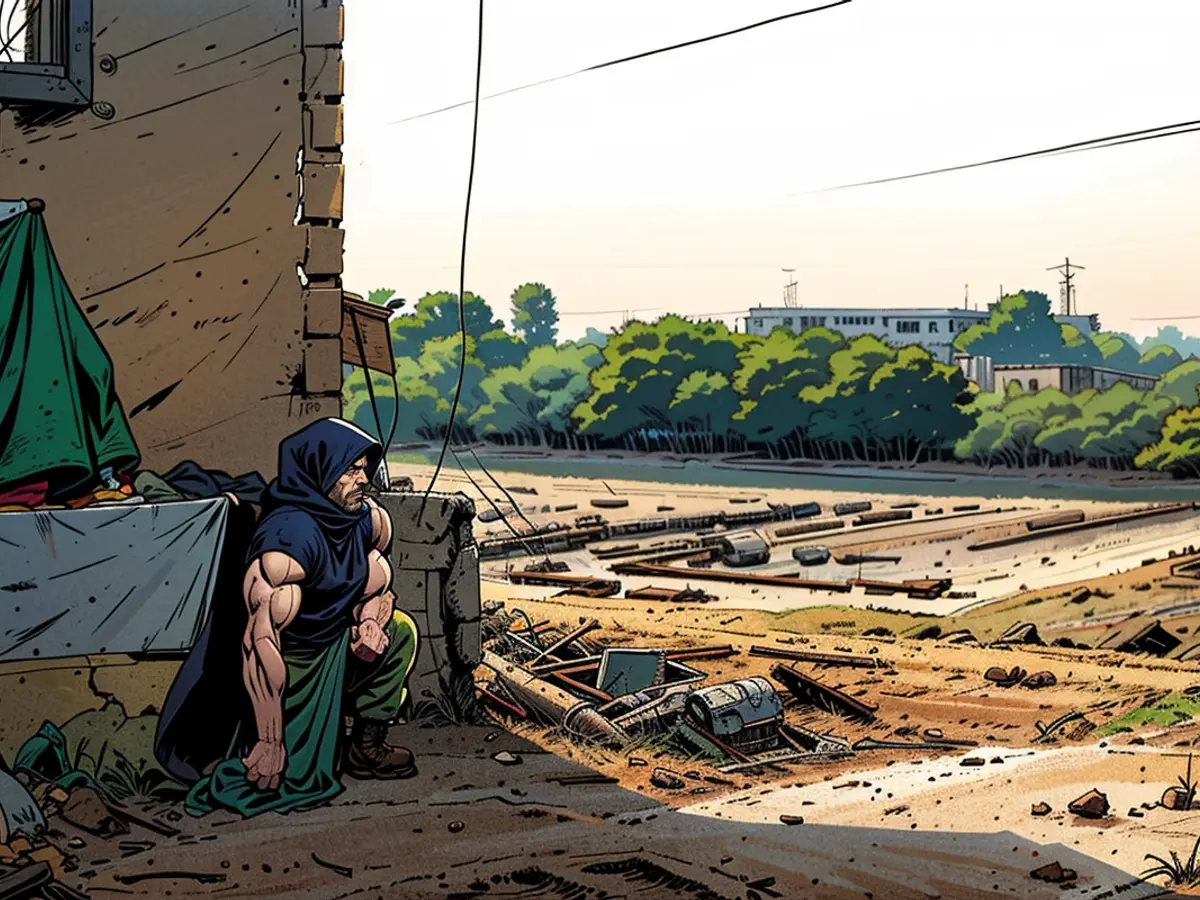Over 130 Israeli reserve personnel pen down a petition declining participation in military operations in Gaza and Lebanon
The incident has significantly impacted every aspect of his life. Now, he's refusing to participate again.
During a phone conversation with CNN on October 7, he expressed his sentiments, stating, "I didn't hesitate because my people were being murdered and killed, and I recognized the need to save them. This necessity hasn't diminished, but it seems the Israeli government doesn't view it as an urgent matter."
Following his second stint of reserve duty in Gaza this summer, he decided that he would decline if called upon for service again. While he believed that military intervention was justified in certain situations, he believed it should be a means to achieve diplomatic solutions that aimed for peace.
He felt that the Israeli government lacked the will to bring about this peace, despite the increasing destruction in Gaza, the worsening conditions of Palestinians, and the hardships faced by Israeli hostages.
On October 9, he, along with over 130 other Israeli reservists, signed an open letter to Prime Minister Benjamin Netanyahu and Defense Minister Yoav Gallant, expressing their refusal to serve until a ceasefire agreement was reached and the 101 hostages in Gaza were returned.
The letter stated, "For some of us, the tipping point has already been reached, and for others, it's approaching rapidly - the day when, with heavy hearts, we will no longer report for duty."
His tipping point had been reached, but making the decision wasn't easy.
On one hand, refusing to serve felt like abandoning the hostages and giving Hamas control of Gaza - a situation he believed made Palestinians' lives worse.
On the other hand, continuing to serve risked being involved in a war resulting in another Israeli occupation of Gaza, which he wanted no part in.
Despite Netanyahu's assertion that there would be no resettlement in Gaza, Vilk expressed doubt due to the government's support for the expansion of settlements in the West Bank, which was occupied by Israel. Netanyahu's cabinet included far-right ministers who had advocated for Israeli settlements in Gaza.
"They've put me in an impossible situation... I feel betrayed by my own government," he said.
He wasn't alone in his feelings.
Max Kresch served on Israel's border with Lebanon for 66 days following October 7. Tensions escalated in the border region as the Lebanese militant group Hezbollah pledged support for Hamas in Gaza. Now, Kresch has had enough. Upon returning to Jerusalem at the end of December, he struggled to readjust and fell into a deep depression.
Serving was challenging for him due to the "religiously militaristic" atmosphere, as many of his companions were religiously motivated to participate in the conflict, which was uncomfortable for him.
He recalled a soldier expressing the belief that killing Palestinians in Gaza, including children, was a Jewish religious duty, as they would grow up to be terrorists.

Israel's National Security Minister Itamar Ben Gvir has expressed similar sentiments. Kresch found it "terrifying" that Ben Gvir's views resonated with many people in the country.
Despite working alongside comrades with extreme views, which were "extremely difficult to hear and tolerate," Kresch considered them good people, making his decision to refuse serve challenging - and lonely.
By signing the letter, he explained, he wasn't trying to dissuade others from serving but to support those who had already decided to refuse.
Fears of an endless conflict
Kresch's fears peaked as Israel celebrated the one-year anniversary of the October 7 attack, viewing it as the final straw.
"We've reached one year, and still, no hostage deal... but achieving a deal won't magically make me ready to return. The camel's back has been broken, and it takes more to heal it," he said.
A 28-year-old reservist, who wished to remain anonymous due to concerns for the families of soldiers who lost their lives, served in Gaza for over 130 days. He felt the strain of the anniversary equally.
"The military pressure has been overwhelming for more than a year, and I don't believe any further military action will change the situation," he told CNN.
Like Kresch and Vilk, he felt that military action was necessary on October 7, but he questioned the purpose.
"We can keep bombing Gaza... I won't even address the civilian toll because people in Israel tend to shut down when we talk about it. But the utilitarian toll. There's no point in fighting a war that could last forever," he said.
The concept of an endless conflict has become a rallying cry used by critics to describe what they perceive as Netanyahu's desire to prolong the conflict for his own political gain. Netanyahu has pledged that Israel will "continue to fight" until its enemies are defeated, hostages are returned, and citizens can safely return to their homes in the south and north.
Last month, Israeli forces launched an invasion of southern Lebanon to begin the "next phase" of the war against Hezbollah.
Former border servant Kresch, who served last year, considered Hezbollah as a threat requiring deterrence at the time. However, he now believes Netanyahu is exploiting Israel's collective trauma for political advantage.
'No Room for Reticence'

Reservists have declined service following Hamas attacks on several occasions. In May, more than 40 reservists expressed their refusal after Israeli forces invaded Rafah, the southern Gazan city.
The count has significantly increased for this recent letter, with over double the number, and the stakes have risen as Israel engages in multiple conflicts.
Transportation Minister Miri Regev, speaking to Kann News, called for those who signed the letter to be detained.
"There is no room for reticence in the army. Neither from the right nor from the left," she asserted.
A few days after the letter was published, Kresch claimed he received a call from his unit's officer responsible for calling up reservists. The officer requested him to retract his statements or promised not to summon him again, Kresch claimed.
"It was like a 'you're not ending things with me, I'm ending things with you,' type of conversation, with an undertone of 'we can still work things out,'" Kresch recalled.
"I maintained my stance... As far as I'm concerned, this can't be resolved under Netanyahu, and the person coming after will have a significant task in restoring trust," Kresch said.
Vilk reported receiving a call from his brigade commander a week after the letter was published, threatening to remove him from his position.
Vilk, who served as a deputy company commander in Gaza, defied the call to serve, yet still holds his position. Vilk claimed the brigade commander accused him of violating army orders by speaking against the government.
"I'm unsure of how things will unfold," Vilk told CNN, adding that he was not overly concerned about the consequences.
"I'm more concerned about my moral choices, my personal well-being, and my ability to look back and believe that I made the right decisions and stood on the right side of history," he said.
The 28-year-old reservist echoed his sentiments. He hadn't anticipated the letter gaining traction, but hoped it would promote a positive impact.
"My conflict isn't with those who choose to serve... It's about obeying orders when it benefits our nation and saves lives, but not obeying when it's unnecessary and detrimental," he explained.
"War is undesirable. We should try to make it as brief as possible. Currently, it seems as though war has become our leaders' objective, rather than a means to an end."

In light of the escalating tensions in the Middle East, the speaker expressed his concerns to CNN, stating, "The world needs to take notice of the situation in Gaza and Israel, as the future of peace in the region hangs in the balance."
Furthermore, the speaker highlighted the impact of the ongoing conflict on the mental health of Israeli soldiers, saying, "The world needs to understand that the Middle East is not just a geographical region, but a complex web of human lives affected by political decisions, and these decisions have serious ramifications on people's well-being."







